
Bryan Wall discusses the relationship between Islam and the west; he argues that the non-religious should be careful to keep a healthy criticism of religions free from the stains of racism and imperialist discourse.
Many in the atheist movement have been extremely outspoken about what they see as the dangers Islam poses to the West, notably Pat Condell, Sam Harris, and the late Christopher Hitchens. They use the terrorist attacks of 9/11 or the election of Hamas in Gaza to prove their thesis that Islamic Fundamentalism is on the rise and needs to be stamped out.
However, all of these criticisms tend to be ignorant of the history between the West, Islam, and the Middle East. Islam and the Middle East have always been seen as the “other”, the outsider against which Europe’s leaders have sought to define their own cultures, whereby the West’s culture is a superior, more enlightened one. Islam, not only its more extreme manifestations but Islam in general, is perceived by many as a threat to rationality, science, and secular, liberal values, all of which we believe Europe to contain in great amounts.
What is seen in much of the discourse surrounding the Middle East in the various non-religious movements is simply a rehashing of tired clichés, canards, tropes, and general Orientalism that have existed for centuries. We may think that these criticisms are nuanced and novel, but they have their foundations in colonial jaunts across the Middle East and Northern Africa which go back centuries.
However, all of these criticisms tend to be ignorant of the history between the West, Islam, and the Middle East. Islam and the Middle East have always been seen as the “other”, the outsider against which Europe’s leaders have sought to define their own cultures, whereby the West’s culture is a superior, more enlightened one. Islam, not only its more extreme manifestations but Islam in general, is perceived by many as a threat to rationality, science, and secular, liberal values, all of which we believe Europe to contain in great amounts.
What is seen in much of the discourse surrounding the Middle East in the various non-religious movements is simply a rehashing of tired clichés, canards, tropes, and general Orientalism that have existed for centuries. We may think that these criticisms are nuanced and novel, but they have their foundations in colonial jaunts across the Middle East and Northern Africa which go back centuries.
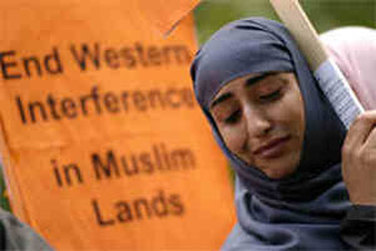
Activists demonstrating again Western intervention in the Middle East
When people think of the Middle East and its conquering, or attempted conquering, by European powers, most, I would hazard an educated guess, would immediately think of the Crusades in the Middle Ages. Between that time and 9/11, one would think that the West and the Middle East have lived in peace and harmony, all the while an Islamic threat was rising and us in the West were innocently oblivious to it. This ignores much of the history of European intervention in the region.
To take a more recent example of intervention in the Middle East, recent in comparison to the Crusades, one only needs to look at Marx writing in 1852 regarding the attempted conquering of Egypt in the late 1700s by Napoleon. The natives, and by extension Islam, were seen as too primitive to govern themselves, this being summed up aptly by Marx when he wrote, “They cannot represent themselves; they must be represented”. We have seen this discourse, that those in the Middle East are unable to rule themselves, put into action time and time again over the last century; in Egypt in 1956 during the Suez Crisis and later in Western support for the dictator Hosni Mubarak; in Tunisia in the propping up of dictator Zine El Abidine Ben Ali; and in Iraq, in 2003, 1991, and 1917 - I could go on but the list would be tediously long. As a further illustration of the West’s interference in the region, Robert Fisk noted in 2008 there were at that time “22 times as many military forces, per man, in the Muslim world, than the Crusaders had in the 12th century.” And then we wonder what why some in the Middle East have come to hate us, the West?
The problem now is that this discourse no longer remains confined to those on the right of the political spectrum. Now, we see this discourse bleeding into the atheist movements around the world, most of who would identify as liberal and leaning to the left of the political spectrum in various degrees. The discourse here is no different from what we would come to expect from any Orientalist discourse: Islam is primitive; the Islamic threat; Islamic terror; etc.
The problem now is that this discourse no longer remains confined to those on the right of the political spectrum. Now, we see this discourse bleeding into the atheist movements around the world, most of who would identify as liberal and leaning to the left of the political spectrum in various degrees. The discourse here is no different from what we would come to expect from any Orientalist discourse: Islam is primitive; the Islamic threat; Islamic terror; etc.
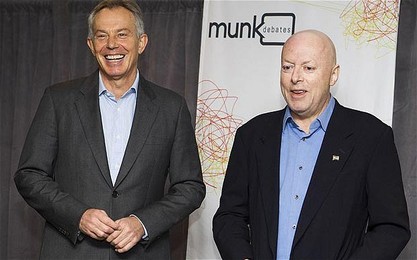
Tony Blair and Christopher Hitchens debate "Is Religion a Force for Good in the World"
The late Christopher Hitchens was notorious for this when he became a cheerleader for the U.S.-led invasion of Iraq in 2003. For Hitchens, the deaths of upwards of 500,000 Iraqi children due to U.S. imposed sanctions on the country between 1990 and 2003 was of little concern. When asked, just a year before his death in 2011, if the consequences of the invasion of Iraq outweighed the benefits, he declared that the benefit of seeing Saddam Hussein put on trial and humiliated outweighed the destruction of a civilisation and its people.
Whilst Hitchens is no longer with us, the discourse which he was a master of is still here and will be for some time to come. The real problem is not Islam. The problem is fundamentalism in general, be it religious or political. It is perfectly acceptable to be critical of everything and indeed one should be. The problem is when criticism is mixed in and mixed up with ignorance and racism. This is how much of supposedly liberal Europe, the West, and now some non-religious figures function when it comes to Islam. We can be critical of religion just as we should be critical of any dogma. The issue is that we must not be ignorant of history whilst doing so.
All opinions expressed in this post are the author's own. They do not represent any official position of Cork Humanists nor do they necessarily reflect the opinions of any other individual.
Bryan Wall is Ph.D student at University College Cork. Bryan's research focuses on citizenship within Israel. He examines the discourses surrounding non-Israelis in particular and how they have been constructed in Israeli society and media.
All opinions expressed in this post are the author's own. They do not represent any official position of Cork Humanists nor do they necessarily reflect the opinions of any other individual.
Bryan Wall is Ph.D student at University College Cork. Bryan's research focuses on citizenship within Israel. He examines the discourses surrounding non-Israelis in particular and how they have been constructed in Israeli society and media.

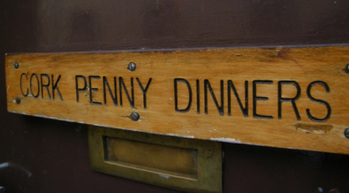
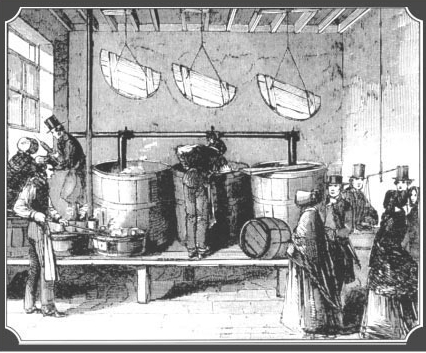
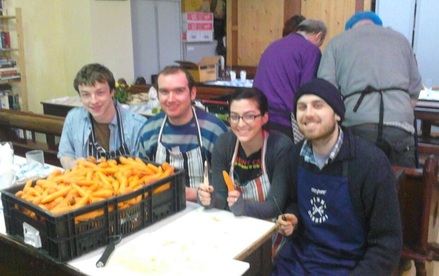
 RSS Feed
RSS Feed
